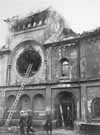 Kristallnacht
Kristallnacht
On November 9, 1938, Adolf Hitler attended a dinner in Munich to honor Nazi Party heroes. During the course of the evening, he received word of the death of Ernst vom Rath, a German diplomat in Paris. Upon receiving the news, Hitler spoke intensely with his propaganda minister, Joseph Goebbels, and then left without giving his customary speech. Goebbels took the floor. After announcing Rath's death, he referred to the anti-Jewish violence in Germany earlier that week. According to Goebbels, Hitler did not wish for such demonstrations to be "prepared or organized" by the Nazi Party. However, Goebbels added, Hitler did say that if those actions "erupted spontaneously, they were not to be hampered." This encrypted signal was the product of Rath's murder. A Jewish teenager named Herschel Grynszpan provided the excuse for the Third Reich's worst prewar pogroms, which left the German streets littered with shattered glass from Jewish synagogues and store windows. These pogroms came to be known as Kristallnacht -- "Crystal Night" or "Night of Broken Glass." On November 7, 1938, Grynszpan, 17, was eking out his existence in Paris. At that time, his family was among some 17,000 Polish Jews--many of them, like the Grynszpans, longtime residents of Germany--whom the Nazi government had deported to Polish territory in late October. When the Polish state refused them entry, most of these hapless Jews ended up in a miserable Polish refugee camp near the border town of Zbaszyn. Grynszpan correctly inferred that his family was in serious trouble. "We don't have a cent," his sister Berta wrote in a letter to him. Her brother did not have much more, but he had enough money to buy a pistol. Next he went to the German Embassy, asked to see an official, and then shot and fatally wounded Ernst vom Rath. As Rath lay dying, Nazi plans were laid to give free rein to the "spontaneous" eruption of "popular anger" that news of the shooting had provoked. Within 48 hours of Rath's death, hundreds of Jewish synagogues were torched--while fire brigades idly stood by. More than 7000 Jewish businesses were looted without intervention by the police. Jewish cemeteries were desecrated. Some 91 Jews were killed, and 30,000 Jewish men were placed under arrest and sent to the newly enlarged concentration camps at Dachau, Buchenwald, and Sachsenhausen. Jews were blamed for the pogrom and had to pay for the damages as well. A fine of one billion Reichsmarks -- equal to some 400 million U.S. dollars at 1938 rates -- was imposed on the Jewish community. Kristallnacht showed that no Jew could ever expect to live a normal life within the Nazi dictatorship.
|
